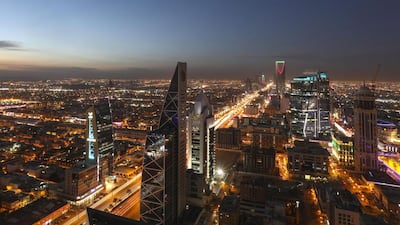The non-oil private sector in Saudi Arabia had subdued growth in January, with fewer new orders linked to the introduction of VAT in the kingdom, according to a key gauge.
However, hiring picked up to its strongest level since August 2016 and business optimism reached an eight-month high, according to the Emirates NBD Saudi Arabia Purchasing Managers' Index survey measuring business conditions in the kingdom.
"The softness in the January PMI survey was fairly broad-based, with faster employment growth being the main highlight," said Khatija Haque, head of Mena research at Emirates NBD.
“Wage increases, fuel subsidy cuts and the introduction of VAT is evident in the higher input costs and staff costs components of the survey in January. However, firms were the most optimistic about their prospects in the coming 12 months than they have been since May 2017.”
The seasonally adjusted Saudi Arabia PMI declined to 53 in January from 57.3 in December, as business conditions for the non-oil private sector recorded the slowest improvement since August 2009 when the index was first published. A reading above 50 suggests the non-oil economy is growing, while a reading below 50 suggests a contraction. The survey is sponsored by Emirates NBD and produced by IHS Markit, a financial information services company.
Survey respondents cited intense competition for new work and temporarily softer order demand following the introduction of VAT. Accelerating cost pressures were linked to fuel subsidy cuts and VAT, the bank said.
Saudi Arabia is enacting a far-reaching package of reforms to diversify its economy in the face of lower oil prices and heightened global competition. The kingdom has introduced VAT and increased energy prices as part of reforms aimed at increasing revenue and narrowing the fiscal deficit caused by low oil prices.
International Monetary Fund's mission chief to Saudi Arabia Tim Callen told The National the kingdom is pursuing an "appropriate" fiscal balance target to allow the country to adjust to reforms.
_______________
Read more:
Saudi Arabia pursuing an appropriate fiscal balance target, IMF mission chief says
UAE non-oil sector index dips slightly in January
Saudi Arabia unveils biggest ever budget to propel growth
_______________
As the business environment matures, private sector companies continued to boost their operating capacity in January, evidenced by a sustained rise in employment levels, the survey showed.
The rate of job creation was the fastest for almost a year-and-a-half, with several firms noting that business conditions were expected to improve over the course of this year, said the survey. Business optimism was at its highest level since May 2017.
Purchasing prices rose at the fastest pace for three-and-a-half years, while staff wages increased to the greatest degree since September 2016, driven by competitive market conditions.
However, average prices charged by businesses increased only marginally in January – suggesting that companies continued to absorb higher operating expenses.
As a result, Saudi Arabia's economy is likely to face continued pressure for most of the first half of this year, as it adjusts to new fiscal measures. Growth is expected to pick up in the second half of 2018 "as consumption patterns normalise and the investment cycle kicks in", Emirates NBD said.

